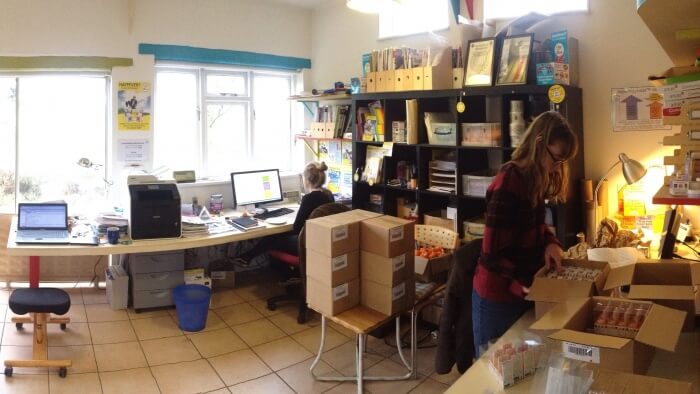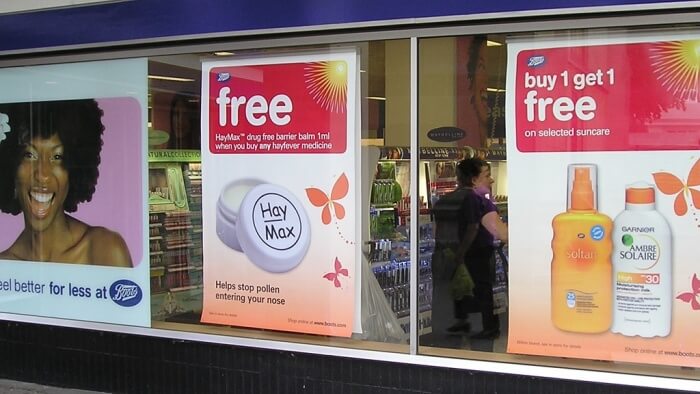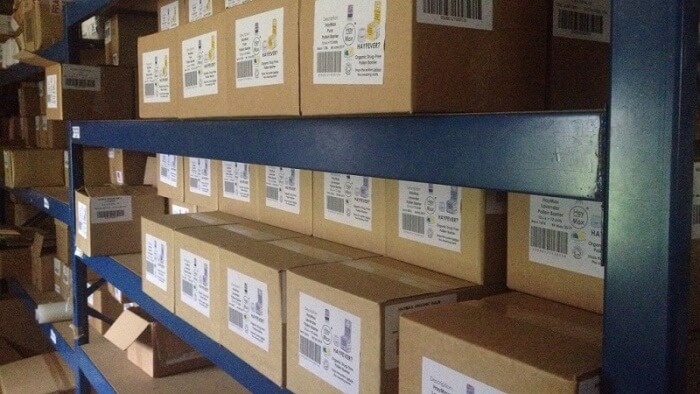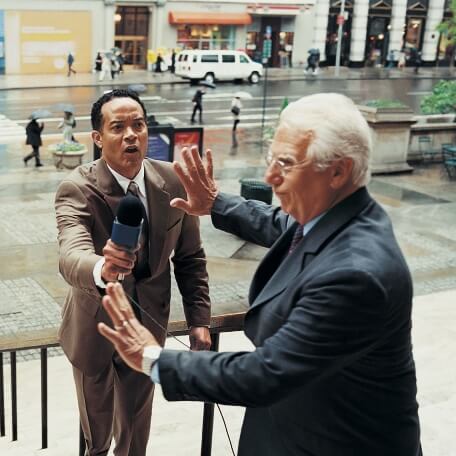How hay fever remedy HayMax's tiny team is conquering the high street and plotting international expansion.
Sniffing Out Opportunities: Max Wiseberg's HayMax
How hay fever remedy HayMax's tiny team is conquering the high street and plotting international expansion.

Max Wiseberg (above), CEO and creator of the HayMax allergen barrier balm, has a healthy approach to the work-life balance. Here he explains how he reconciles international expansion with a micro-business mentality.
Give us an idea of your business in a nutshell.
HayMax is a range of organic drug-free allergen barrier balms for people with hay fever, dust or pet allergies. When applied (invisibly) to the bottom of the nostrils (where the inside meets the outside of the nostril) and around the eyes, HayMax traps the allergen before it gets inside the body or touches the eyes. Less allergen, less reaction. And many people tell us they are able to stop taking their medication. In a study by Allergy UK, 80% of respondents said HayMax worked.
How did the concept get off the ground?
I have suffered from hay fever all my life. I have tried everything: tablets, sprays, injections, homeopathy, all sorts of things. Some helped for a while and then didn’t any more. Some just made me feel rotten – headaches, drowsiness, etc., and some just didn’t work at all. Every year I would hope that this would be the year when my hay fever would not be so bad.
Maybe I would cope this year without any drugs. And then my streaming, itching eyes and constant sneezing and running nose would drive me into the nearest pharmacy to see if there was anything new this year to help me.
Then a discussion with my sister led me to try petroleum jelly on my nose. It was slimy and horrible and didn’t smell nice, but I thought it did make some difference. So I started playing around and, after some time, I came up with something new which was invisible when applied, which didn’t smell bad (and I added some essential oils in 2 versions to make them smell great), but which, most importantly, worked! And it worked when I used it in the second season.
That had never happened to me before. But not only was it working for me, it wasn’t giving me any nasty side effects. I had made it using organic ingredients, as that meant I was only putting clean things on my face. Non-organic sunflower oil, although perfectly natural, can contain pesticides and all sorts of nasty things that you wouldn’t want to go anywhere near your body.
I was then made redundant from my previous job as a sales director, so I ran a simple trial to see if it worked for everyone else as well as it worked for me, and it did. I seemed to have made a drug-free product for hayfever sufferers that actually worked! The market is huge and I knew I only had to get a tiny proportion of it to end up with a successful business.
How has it grown?
I didn’t want to grow an empire. My children were small and I wanted to spend time with them every day. The old adage “no-one ever said on their deathbed that they wished they had spent more time at work” was in the back of my mind. So I outsource functions when they reach the right critical mass. This way I am able to keep my direct staff to a minimum, whilst creating jobs at my suppliers.
We aren’t a huge company and we have not yet turned over a million pounds, but our little team of four managed to grow our business, now in its 13th year, by over 10% in 2016.
Once we had proved that the product was good by running some studies and encouraging the press to do their own tests, and by selling successfully to hundreds of Independent health food stores and pharmacies countrywide, the multiples became interested.
HayMax is still sold in thousands of independent shops who we love to support, but we are also proud that we are in Boots, Waitrose, Morrison’s and Holland and Barrett. And we have started to export, too. We entered the US and Spanish markets last year, we already export to 3 or 4 other markets and we are adding 2 or 3 new markets again in 2017.
Is your sector welcoming to new entrants?
It’s not easy! The big companies’ advertising dwarfs anything we can afford. And although social media provides so many more channels, it is not easy to for a small business to cover all the available channels and make enough noise to have an effect. It’s a huge opportunity though and there is always room for growth.
We want to increase our brand awareness in the multiples, whilst supporting the independents to increase sales with some lines which are exclusive to them. I want to see my children through their education and re-evaluate at that point. Till then, I just want to grow, grow, grow!
What have been the biggest barriers you faced?
Regulation was the first hurdle. If HayMax had been classed as a medicine I would not have been able to afford to launch because of the heavy costs involved.
However, because it has no physiological effect on the body; it is a physical barrier which prevents the cause of reactions from entering the body and triggering the symptoms, rather than treating the body once the symptoms start, it was classified as a medical device. That was a scary moment though, as we had already started and I thought we might have to close down at one point.
Organic certification is not designed for our type of product and so we end up with constant challenges created by that.
But our biggest challenge has always been in getting our name known. Sometimes it feels like however much money we spend on marketing and PR, there are still so many people who have never heard of us. We meet them every year at exhibitions. “Why have I never heard of you?” people ask us. “I wish I had known about you years ago”. We do too! Tell your friends.
So how do you get your name out there?
We started by making as much noise as possible, buying late space in all sorts of magazines and thereby buying large amounts of space at a fraction of the normal cost. We had to be fast and flexible to do this; artwork had to be ready within hours. I got quite at good at Photoshop!
People assumed that we would market in all the health publications, but we took a different view. Hayfever affects people whether they are interested in health or not, so we advertised and sought PR in all sorts of magazines, web sites and blogs, from Trout Fishing to Fashion to Sport. It was our thinking outside the box moment, and it worked.
We drove customers into pharmacies and health food stores all over the country asking for HayMax. Our wholesalers said that what they liked about us was that we created ‘pull’.
As social media channels came on stream we engaged with those as much as possible. It’s great to talk to the real customers and these channels allow a manufacturer to do that. We have always been lucky that consumers get in touch with us regularly to tell us how delighted they are with HayMax, but anything that helps this process is good. Feedback helps us to do better!
What gets you out of bed in the morning - and what makes you want to stay there?
Being your own boss answers both those. Some decisions are really difficult and the buck very definitely stops here. I am lucky that my partner is involved in the business so I can talk to her about things and that often helps. Networking is also really useful - sometimes experiences of people in completely unrelated businesses can be really instructive.
But it’s also great to be able to make my own decisions, whether they are right or wrong, without having to report to a board of directors who make me carry out actions which I know to be wrong, but am powerless to change. That is a real freedom.
I’m not always right, but at least I get to try things my way. I also try to remember how that felt for me in previous roles, when my own staff suggest things which I don’t agree with, and try to allow them to make their own decisions.
What would you change about doing business in the UK?
I would make it a legal requirement for big business to pay small businesses on SHORT payment terms. The government made it illegal for big business to pay small business late. So they just change the payment terms. Big companies pay us on 60-90 day terms and these are not negotiable.
We simply do not have the power to drive that negotiation. Some offer shorter terms for bigger discounts. This should not be allowed. SME’s are known to contribute more to overall taxation and GDP and they should be supported. My letters and emails to various government departments about this were largely ignored until recently.
One significant exception is Waitrose. They recently introduced 7 day payment terms for small businesses. Good for them!
What is your biggest mistake?
I have made so many mistakes it’s hard to pick one out. The important thing is to try to learn from the mistakes to get it right next time, and to move on. Not always easy! But every mistake is a learning opportunity.
What's your USP and how have you nurtured that point of difference?
When we started our business in 2004 and in the following years, selling organic and having green, sustainable and fair ethics was pretty unusual and people really love that about us. It’s a band wagon everyone is jumping on now – which is A Good Thing!
But our real difference is about selling a product that is organic and drug-free, but that works, in a market where people have always felt that if it isn’t a drug, it won’t do the job.
What’s really great is that we have seen a real sea change in the attitude of doctors. As long as there is some real evidence of efficacy, they are far more prepared to embrace complementary medicine that they were when we started out.
How do you keep employees keen?
I paid for my marketing manager to complete her CIM Marketing qualifications and gave her study leave to help, instead of her going back to university to do a marketing degree.
I keep telling her to leave and to broaden her CV, but she keeps staying because she is passionate about what we do! As much as it is important to retain staff, it is important to help them to achieve their full potential and to be open-minded about opportunities that might be available to them in different organisations.
For another member of staff who is keen on art and design but works in our logistics area, we have purchased the Adobe suite of programmes and some training so she can learn how to use computers for design. Also, she is a great detail person so we have extended her remit to include managing our componentry and raw materials inventory. This gives her extra skills at the same time as it makes her job more interesting. True win-wins.
The only problem for them is that they have to work with me – it’s an open plan office.
Do you rate government support for growing firms?
I have not managed to get much. I found their export support close to useless. I think the support of small businesses and start-ups is at best, patchy. I know other people who have managed to get lots out of government so I know it is possible, but I know more who haven’t.
It seems to me that, in order to get good support you have to have a particular skillset to be able to get access to the best support. That should not be the case.
What are your top three tips for people starting a business?
Believe in yourself and your own gut reactions. When I was setting up HayMax and all sorts of people were advising against it, a friend advised that everyone would tell me not to do it and then, when I started the business everyone would tell me how to run it. He told me to ignore them. And he was right. But…
Listen to people who know, and try to use what they know to translate their wisdom for your business. But…
Think differently! Sometimes doing the opposite of what everyone else is doing will make the difference.
Thanks for signing up to Minutehack alerts.
Brilliant editorials heading your way soon.
Okay, Thanks!





